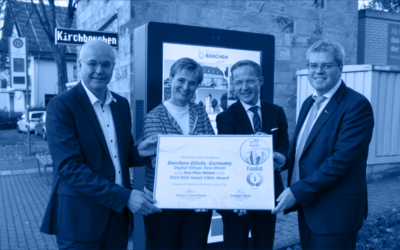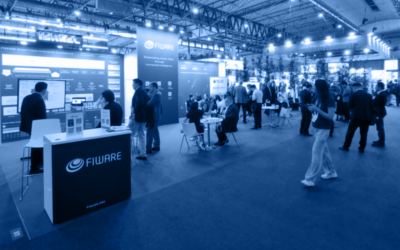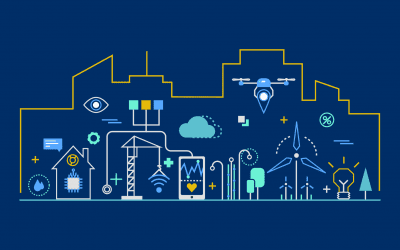Here are the 20 ideas that will compete in the Smart Cities Challenge we launched and that will be held at Campus Party Brazil 2014 at the end of January 2014.
Campuseros that are in Sao Paulo those days will see, first hand, how these ideas have been developed and how they are improved. During Campus Party all the teams will receive coaching from FI-WARE experts and the winning applications will go home with their own FI-WARE application… and plenty of money for the victorious team to celebrate 🙂
Good luck to all!
Smart Cities finalists
The teams selected for the Smart Cities challenge are from Spain (9), Brazil (3) Mexico (3), the United States, Turkey, Belgium, Ecuador and Italy.
Smart Zity
Alberto Martin Alcubierre, César Álvarez Jiménez, Daniel Prol Martín-Ambrosio, Pepe Vila Bausili and Alejandro Céspedes Vicente from Spain.
The idea is to give cities the opportunity to connect their public infrastructure (such as lights, fountains, giant screens and other elements) with citizens, giving them the ability to interact with their environment. Through the use of FI-WARE hashtags the cities that use this technology will turn FI-WARE into "trending topic".
Sparky App
Tenoch Gonzalez Rojas, Dulce Ambrocio Alazañes and Alejandro Santamaria Arza from Mexico.
Finding parking in large cities is a nightmare. The Sparky team is building a mobile application and a hardware device to help parking owners share their spaces while not in use and help drivers find a short or long-term parking place.
Quick Parking
Antonio Sanchez Pineda, Oscar Ramírez Jiménez and Pedro José Ruiz López, from Spain.
QuickParking is born from a very common problem in cities today: managing public parking. Searching for empty parking spaces is a tedious task that takes a lot of time, resulting in decreased productivity for businesses and increased pollution in our cities. The application allows the citizen to quickly search and find a vacant spot.
Smart Auto Parking
Carlos A. Albarrán Díaz de León, Cristina G. Escalante Minakata and Israel Tamayo Ricardez from Mexico.
Smart Auto Parking presents an autonomous system for street parking and registration control by using mobile technology, NFC and Smart Cams. This project could eliminate the use of staff for parking control and expensive hardware such as classic parking meters through automatic payments and fines. The project also facilitates direct payment by users and collection of payments by the city.
VASEC – Value Added Security and Safety Services for Transport
Christian Müller from USA.
VASEC handles security issues associated with road transport and how users are informed by the respective information services of the city in regards to the possible danger zones and optimal route planning by avoiding these areas.
Cares
Juan Manuel Romero Mena, Ricardo Samuel Mendoza Núñez, Juana Paulina Águila Hernández, Carlos Miguel Vázquez Rojas and Margarita Vaca Martín from Mexico.
Based on the motto "Intelligent Health when we want, when we need it and wherever. Thanks to sensors and information stored in the cloud, this system gives much more secure and personalized medical attention. The main goal is to reduce operating costs, improve management of large volumes of data and establish a structure of private security in information management. These advantages can benefit both governments and healthcare organizations.
Social Market
Andrea Tosatto, Claudio Esposito, Carla Ferrer, Marco Jacomella and Salvatore Di Dio from Italy.
Rethinking communities with the use of social media can be an opportunity to promote interaction between citizens and their environment. This platform allows users to share information, opinions… and to be rewarded with credits for their feedback. These credits become bonds that citizens can use to invest in their community (discounts, free use of public spaces, etc.) Active user interaction is the key point.
Urban M
Daniel López Pedrosa, Daniel García Frías, Daniel Iglesias Gonsálvez and Alejandro Torreblanca from Spain.
Urban M is a project that provides an alternative, healthy and ecological means of transportation based on electric and folding bikes that incorporate sensors that contain useful user-data that will be made public to all users. Such as public fountains, etc.
La Urbo Project
Daniel Lima, Letícia Duarte, Hélio Lima and Frederico Flósculo from Brazil.
The objective is to give people the opportunity to express their feelings about the city in which they live, or even a city they are visiting. This way, users can share their feelings on issues such as fear, insecurity, satisfaction, joy, boredom, disgust, calm, excitement, etc. These feelings will be pinpointed, which means that each city will have a map of feelings and impressions of its inhabitants.
Smart App City
Javier Gurría, Ignacio Gurría, Daniel Menchaca, David Martinez, David García, Malta Aldana, Luis Ascorbe and Miguel Garbayo from Spain.
SmartAppCity is an app for smartphones and tablets aimed at local authorities. The application meets all city services: promoting the commercial sector, generating value for citizens and tourists, and improving the quality of life.
We Collect
Ignacio García, Fernando Ruiz and Juan Carlos Delgado from Spain.
WeCOLLECT seeks to encourage innovation in the area of waste collection management from homes to treatment plants. This way the main stakeholders (governments, municipalities, waste management companies, industrial companies, NGOs and citizens) have a better level of understanding of the functioning and the processes involved in waste collection.
Paprika
Enylton Machado, Renato Javier Marroquin, Isabela Medeiros and Roberto Alvarus de Oliveira from Brazil.
This project provides information on public transport to smartphone users through augmented reality. This app allows users of public transportation to plan their daily commute and spend less time at bus stops, making it public transportation reliable and convenient.
Chaos
Şule Yücel, Burak Hançerli, Recep Çağrı Yüzbaşıoğlu, Enes Yüncü and Mesut Yukarıdere from Turkey.
The CHAOS system is formed by a series of cameras placed in various directions that processes images and converts them into data on the number of vehicles passing through an intersection, road or avenue, recording the average speed or even regulating signalling systems that function during a traffic jam. The video images are processed in real time and cameras can work in different lighting conditions.
Apparkart
Marco Vereda, Javier Montaner, Gabriel Herrero and Anne Braun from Spain.
ApparKart is an app that tells you where there is an empty parking place near you. The application detects your current location and proposes areas close to you which probably have an empty parking place. The addresses listed are captured by through active sensors embedded in parking meters. The system also provides a map to get to the suggested area. With this application citizens could save time, money, energy and, of course, reduce air pollution. Another plus: the application is free.
FI-Guardian
Marcos Marconi, Viviane Lessa, Leonan Carvalho and Miquéias Faria from Brazil.
Adverse circumstances such as natural disasters are more and more common worldwide. With proper warning people in Smart Cities can be well informed of these risky events, providing a safer environment for them. The objective of the application is to help intelligent cities become more resistant, aiding in communication, orientation and warning of adverse circumstances such as natural disasters. The solution consolidates tracking system data, centralising information from different sources, and carrying out customisable and intelligent remote sensor analysis, communicating risk events to citizens before they occur.
Spring
Marian Claudiu Moldovan, Ovidiu Mircea Moldovan, Francisco Serradilla García, Denis Roldán Estébanez and Alberto Casero Campos from Spain
Spring is an innovative project that aims to interconnect people, machines and cities, gathering data and providing it to users by geolocating environmental information.
SmartTraffic
Mateo del Río Lostal, Carlos Vicente González and Alfonso Escriche Martínez from Spain.
SmartTraffic is a project that aims to improve traffic with a network of sensors and devices that allow for a more comfortable ride, increase safety and efficiently manage resources. In addition, SmartTraffic recognizes special vehicles and assigns them a priority, facilitating their passage by modifying traffic signals. The system also can detect unexpected events such as accidents.
TagTag City
Geoffroy Simon, Olivier Poulaert, Maxime Dewelle, Kenneth Verhelpen, Natalia Vicente, Julie Delande and Michael Lecerf from Belgium.
TagTagCity lists the historical buildings of a city, cultural points of interest and other information, including an attractive description of each one. With customizable buttons, you can add photos, links to Wikipedia, Facebook, etc. In addition to promoting the cultural and historical heritage of the city, TagTagCity can also help stimulate the economy through geolocation: local goverments could choose to offer advertising space to private companies in TagTagCity, allowing users to easily find shops and restaurants while having access to discounts.
City Brain
Sergio Daniel Chamorro and José Vinicio Freire Rumazo from Ecuador.
Most countries around the world have specific areas of interest that have a high population concentration and also are points of interest for visitors. This concentration poses great problems for parking cars. This application will allow tourists and residents to search upcoming events such as festivals, art exhibitions and/or live concert while providing information on nearby parking lots and their availability and prices.
FI-WARE Widgets Smart Hub (Smart Box)
Álvaro Romero Izquierdo, Francisco Javier Herrero Sánchez, Raul Herrero Sánchez, Rubén Ortiz, José Ignacio Dominguez Simón and Daniel Castro García from Spain.
The main objective is to "sensorize" cities, obtaining a huge source of useful information that consumers can check from their homes through a tv screen and a remote control. This team won first prize at the FI-WARE hackathon in Santander.
>> And which are the 20 apps selected for the Smart Business & Industry Challege? Read them here:Ideas selected to compete in the FI-WARE Challenges: part I – Smart Business & Industry.



